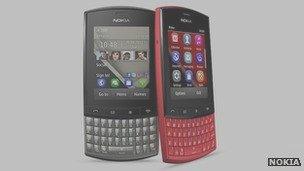Cheap smartphones global market grows
- Published

Asha, the budget smartphone line from Nokia, is outselling its premium handset offering, the Windows-run Lumia, by over two to one.
The firm's quarterly results, published on Thursday, revealed the total number of both Asha and Lumia devices sold in the last three months of 2012 was 14 million. Only 4.4 million were Lumias.
There have also been rumours that Apple may offer a lower-priced iPhone model.
Reports that a senior Apple executive denied this have been withdrawn.
"We forecast that by 2016, 31% of the global overall handset market will be low-end smartphone," Ian Fogg, principal analyst at IHS, told the BBC.
"An entry-level smartphone is very different from a high-end smartphone," he said.
"Smaller, cheaper devices have processors from two or three years ago, they have small screens with low resolution, and weaker cameras. They can all do email and the web but gaming and browsing is a much better experience on the higher end phones."
However the difference in cost to the consumer is significant - in the UK a basic smartphone can cost as little as £29.99, he said, while the iPhone 5 currently retails for £529 on the Apple UK website.
Premium phones
"Apple still play out at the premium end of the market," said Mr Fogg.
"Can they remain profitable and successful being in a small part of the handset market or do they need to be a bigger player to get the economies of scale right?"
According to analysts ComScore, by the end of 2012 only 28% of smartphone owners in the UK had iPhone handsets.
"Apple makes high quality products, it doesn't make cheap products," Mr Fogg added.
"That doesn't rule out Apple creating a cheaper iPhone that still has high quality components. Look at the iPod range - they started with a premium price product, then they added the mini, the nano, the shuffle - they went to a range of products hitting different price points."
Mr Fogg pointed out that there are currently variations of the iPhone 4, 4S and 5 available at different prices.
"Their strategy has been to reuse previous generation model rather than build a new model," he said.
"Apple, I'm sure, is evaluating that strategy. Is it better to use a tried and trusted design that they know how to manufacture and that the consumer understands, or is it better to design a new model that hits that price point?"
At the Consumer Electronics Show in Las Vegas this month, Chinese phone manufacturer ZTE announced plans to launch a lower-end smartphone running on Mozilla's Firefox operating software in Europe this year.
"I think Apple should be more aggressive with its smartphone range," said Mr Fogg.
"I think the strategy they have had of reusing previous year's models has been quite smart, but there is also an opportunity to design a new product that hits that low price point."
- Published8 January 2013
- Published19 September 2012